-
Adopt
-
Veterinary Care
Services
Client Information
- What to Expect – Angell Boston
- Client Rights and Responsibilities
- Payments / Financial Assistance
- Pharmacy
- Client Policies
- Our Doctors
- Grief Support / Counseling
- Directions and Parking
- Helpful “How-to” Pet Care
Online Payments
Referrals
- Referral Forms/Contact
- Direct Connect
- Referring Veterinarian Portal
- Clinical Articles
- Partners in Care Newsletter
CE, Internships & Alumni Info
CE Seminar Schedule
Emergency: Boston
Emergency: Waltham
Poison Control Hotline
-
Programs & Resources
- Careers
-
Donate Now
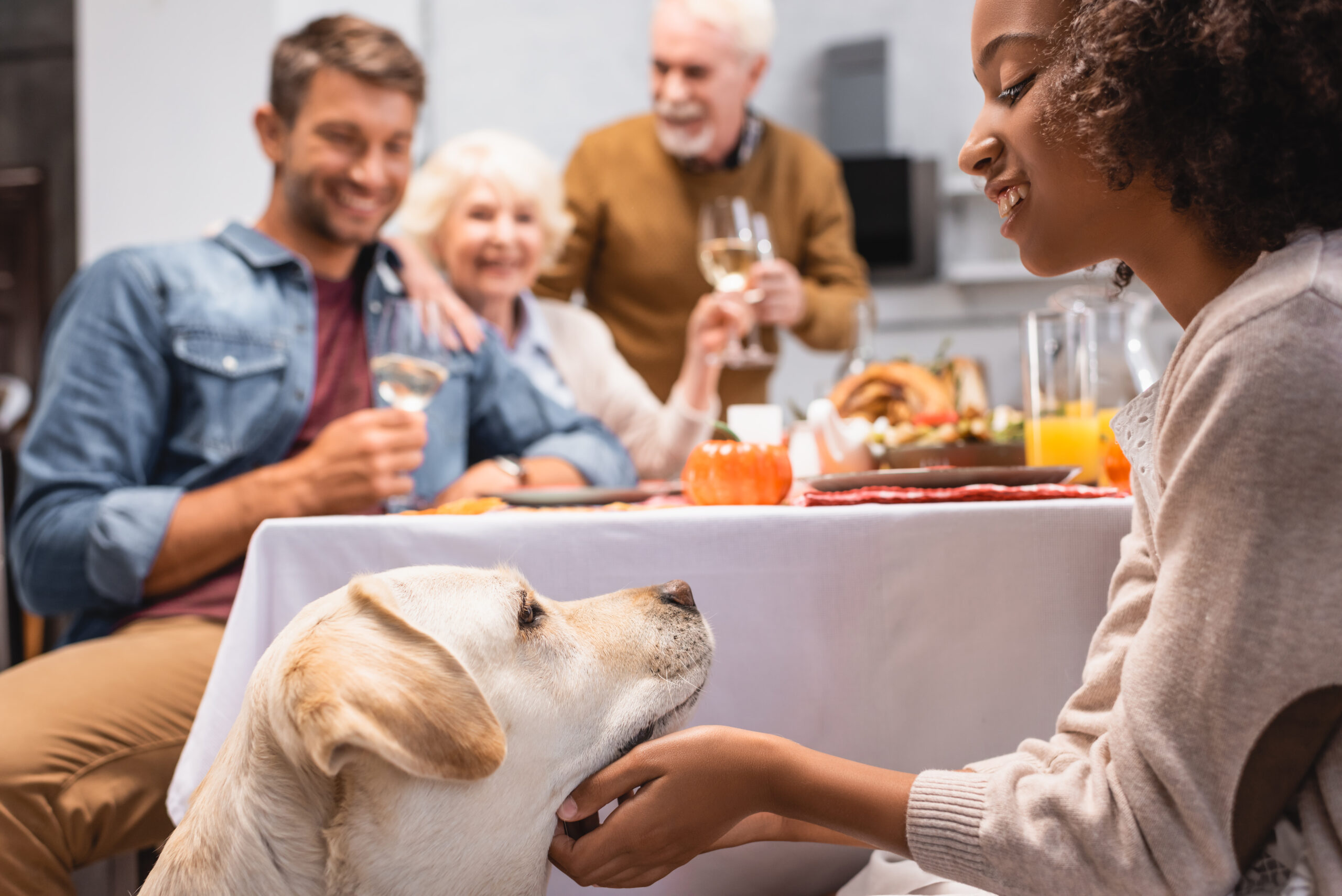 There’s nothing better than spending the holidays with the whole family, including the four-legged furry ones. We may fail to see some of the hazards our pets face during the holidays amidst all the non-stop festivities. Here are some helpful tips for keeping your pet safe to make the seasons memorable.
There’s nothing better than spending the holidays with the whole family, including the four-legged furry ones. We may fail to see some of the hazards our pets face during the holidays amidst all the non-stop festivities. Here are some helpful tips for keeping your pet safe to make the seasons memorable.
Guests visiting for the holidays
Who’s at the door? From parties with friends to relatives visiting, you may have people young and old coming and going over the holidays. Your pets may know some of these folks, while other times, they’re strangers to them. Some pets are naturally friendly and comfortable around just about anyone, but some take time to get used to new faces.
“It’s important to know your pet’s personality before people visit,” said MSPCA-Angell Emergency and Critical Care expert Dr. Allison Allukian. “Are they a ‘people pet,’ or do they like to keep to themselves?” If they’re the latter, you should provide your pet a quiet place to retreat when it gets a bit much for them, like a crate or quiet room inside the house. Include items your pet enjoys, like toys, their favorite blanket, and access to food and water.
Before anyone visits, it’s always a good idea to let them know you have a pet that isn’t comfortable around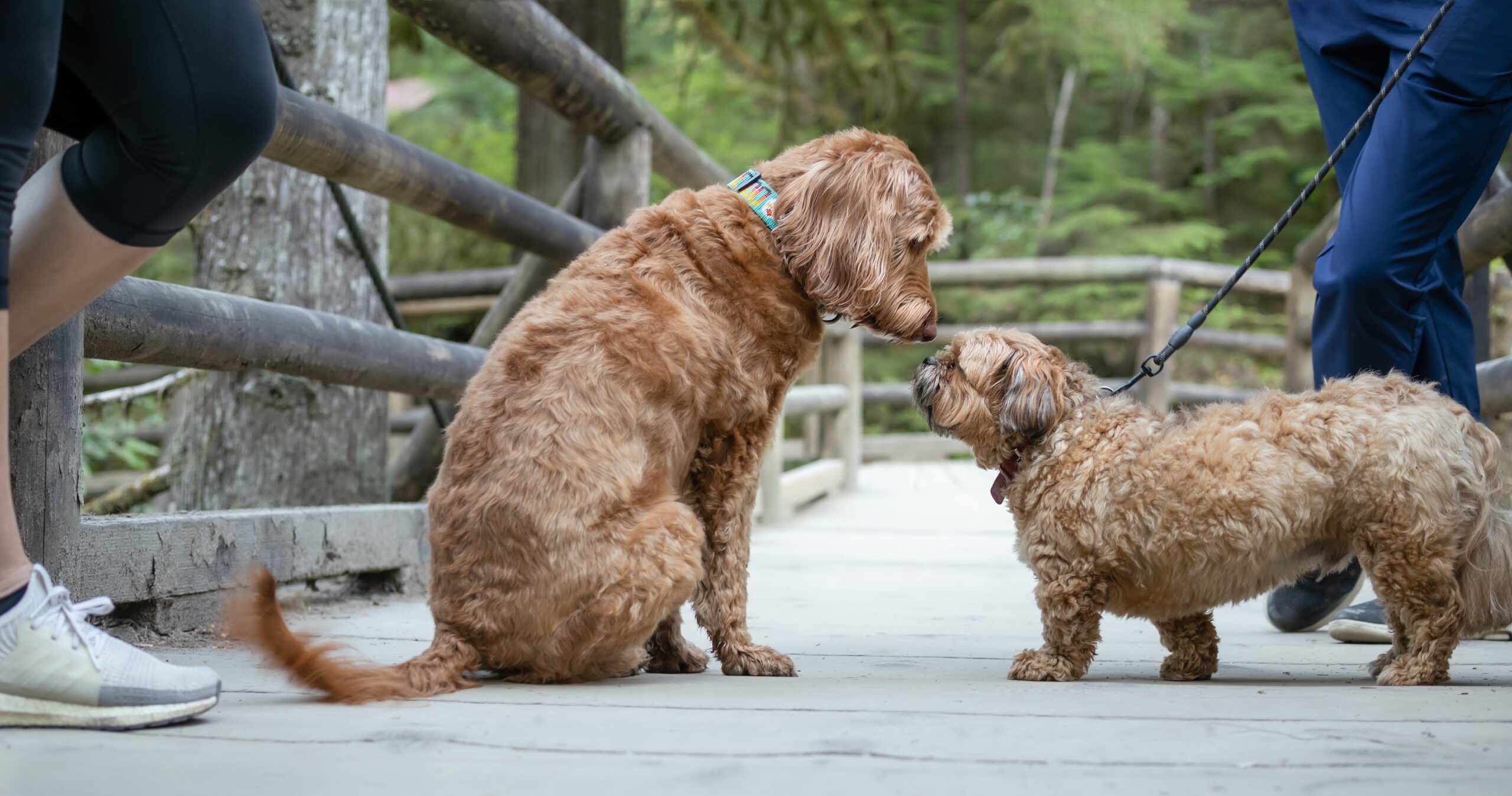 many people, just so they know. Nothing dampens the holiday cheer for an animal lover than trying to make friends with the family dog, and they run away scared! The MSPCA-Angell’s Behavior expert, Terri Bright, offers additional advice for keeping dogs safe when new visitors arrive for the holidays.
many people, just so they know. Nothing dampens the holiday cheer for an animal lover than trying to make friends with the family dog, and they run away scared! The MSPCA-Angell’s Behavior expert, Terri Bright, offers additional advice for keeping dogs safe when new visitors arrive for the holidays.
- Knock-knock! New dogs at the door. Carefully consider introducing dogs to each other who don’t know each other well. Try to meet new dogs outside the home first so there’s less of a territorial issue. If things are tense upon the first meeting, take the dogs on a parallel leashed walk off the property and see if they can relax. If they are still tense or growl — or if either has a history of not getting along with some dogs — it’s not a good idea to risk having them indoors together.
- More is not always the merrier. Even if the dogs are familiar with each other, they might not be able to share things you offer, such as treats, food you drop, or even space. It’s a good idea to keep the dogs loose-leashed. By doing this, owners can manage their dogs in case things get out of control.
- Mine, mine, mine. Sharing is caring most of the time, but that’s not always the case with dogs. When visiting new homes for the holidays, bring your dog’s crates, go-to toys, and favorite treats. Things might get chaotic if your cousin’s pup spots you giving your dog his treats.
- Assign pet-wrangling roles. Appoint a family member to be in charge of the dog or cat (e.g.,
 keep the cat off of the counters and table) so they keep an eye on them. We don’t want an excited dog jumping up and knocking someone over!
keep the cat off of the counters and table) so they keep an eye on them. We don’t want an excited dog jumping up and knocking someone over! - Keep calm and bark on. If your dog has been known to bark a lot at strangers, it may be a good idea to put it in another room while you get guests settled. When and if you let the dog out, keep it on a leash and (if it’s trained) have it move into a sit or lay-down position.
- “Dogs LOVE me!” If you have a dog who’s not keen on meeting new people but you have a guest who insists they’re a dog whisperer, it’s advised to place your dog in another room until you can convince this guest to leave the dog alone. This type of guest will lean in, stare lovingly into your dog’s eyes, and potentially make something bad happen.
Holiday eats and treats
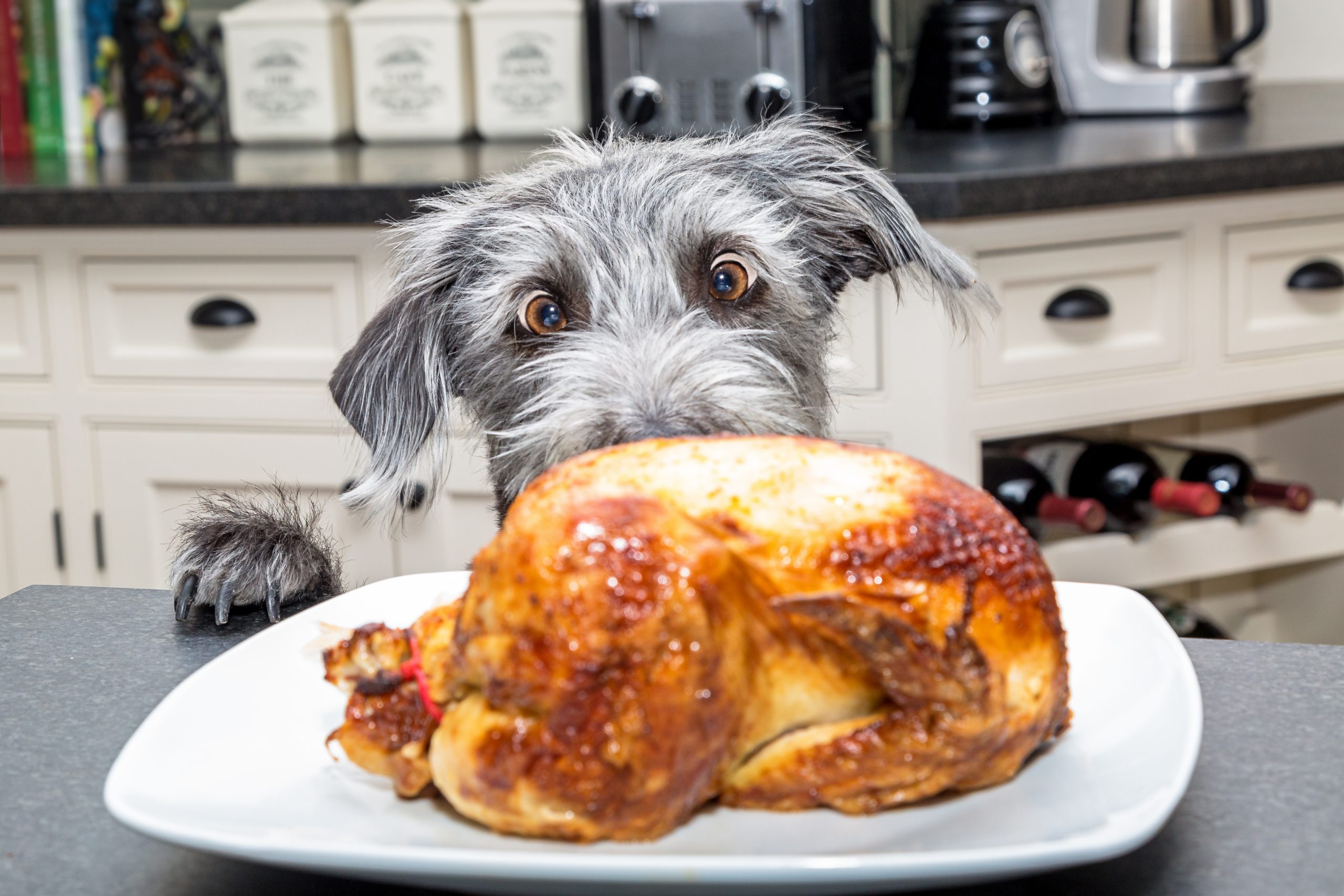 Eating and drinking are a big part of holiday festivities. But what may be suitable for us is only sometimes good for our pets — and sometimes not good at all. Avoiding a digestive emergency should be at the forefront of everyone’s mind when your favorite fur friend comes begging for holiday food.
Eating and drinking are a big part of holiday festivities. But what may be suitable for us is only sometimes good for our pets — and sometimes not good at all. Avoiding a digestive emergency should be at the forefront of everyone’s mind when your favorite fur friend comes begging for holiday food.
Greasy and fatty foods are the two biggest red flags. Fried turkeys at Thanksgiving have been increasingly popular over the past few years, and while it’s almost certain your dog (or cat) would love some of that tasty fried turkey, it’s not advised.
“High-fat meals cause pancreatitis, which is painful for your dog, and can cause vomiting, diarrhea, and lethargy,” said Dr. Allukian. “For example, if you plan to give your dog turkey along with the family dinner, it’s best just to bake the turkey in the oven.” Skinless, unseasoned white turkey meat that’s been adequately cooked is okay for dogs to consume in small amounts. So no matter if your dog is sitting there during dinner giving you sad eyes, skip the table scrap snacks.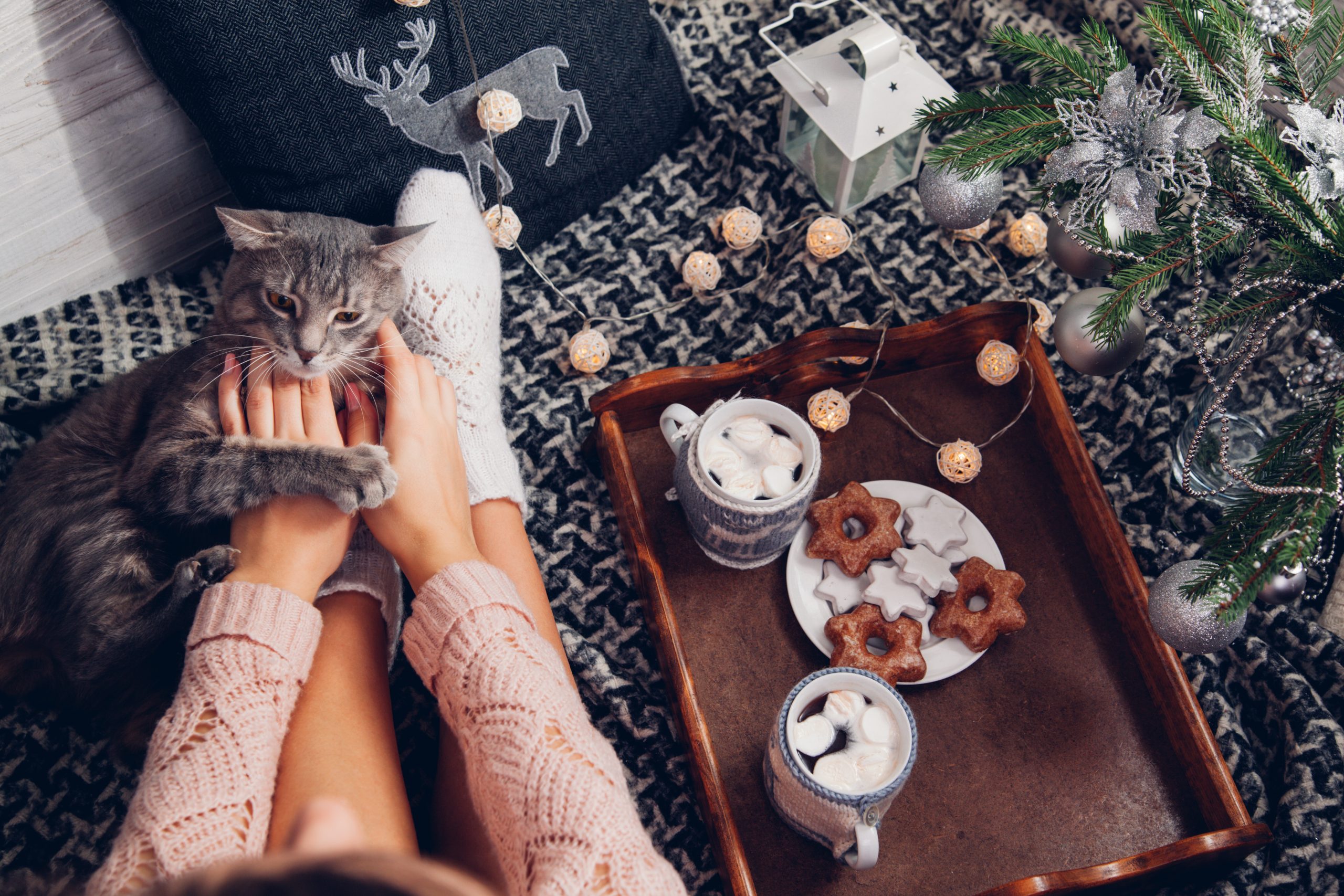
Chocolate is another food that is toxic to cats and dogs. This sweet holiday treat can be found year-round, from Christmas to Easter. Chocolate contains caffeine and theobromine, which are harmful and can cause death if too much is consumed. If your pet gets a hold of chocolate, remember that dark chocolate is worse than milk. For dogs who consume milk chocolate, ingesting more than 0.5 ounces per pound of body weight may put them at risk for chocolate poisoning. For cats, signs of toxicity can occur when consuming 0.7 ounces of milk chocolate per pound of body weight.
Below is a list of additional food items you should keep away from your pets.
Alcohol – Humans know that too much alcohol is never good. For your pets, it’s worse. “I’ve seen some pets come into the Emergency Room because they got into alcohol,” said Dr. Allukian. “Their blood sugars and blood pressure drop. They’re basically intoxicated, so if they consumed a large amount — and that depends on the animal’s size — it can cause seizures and respiratory failure.” So, keep an eye on that glass of wine on the table or the beer you left in the kitchen — your curious pets may try taking a drink.
Citrus – This includes lemons, limes, and grapefruits. The oil from the citrus skin and the seeds in the fruit are toxic to pets.
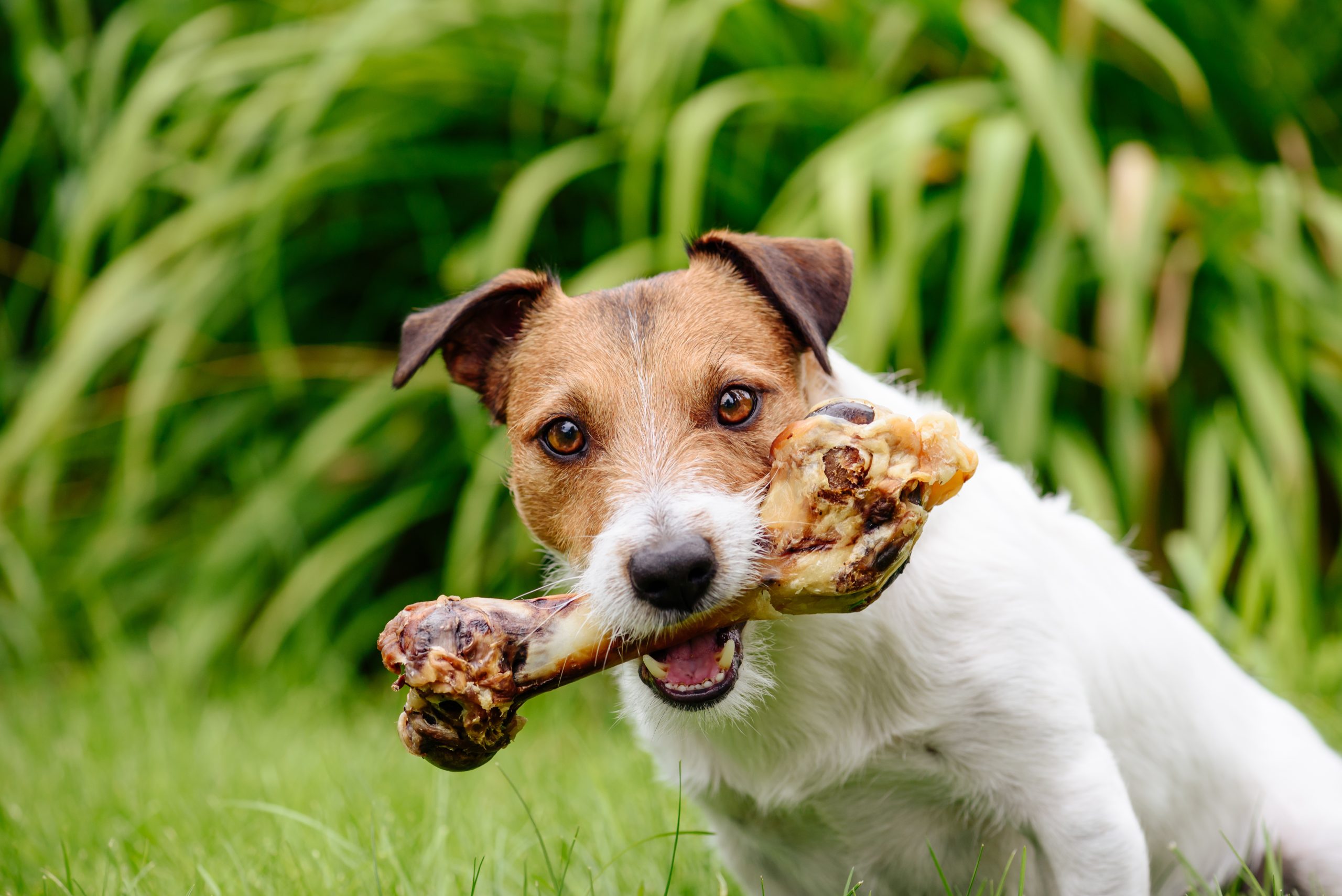 Bones – Whether chicken or steak, no bone is 100 percent safe for your dog to gnaw on. Bones splinter, puncturing the stomach or intestines if ingested, and can ultimately block the GI tract.
Bones – Whether chicken or steak, no bone is 100 percent safe for your dog to gnaw on. Bones splinter, puncturing the stomach or intestines if ingested, and can ultimately block the GI tract.
Grapes and raisins – Eating these sweet treats could cause sudden kidney failure in your pet.
Nuts – It’s best to keep all nuts away from your pets. Not only are they oily and high in fat, but they can cause GI obstruction if consumed. Macadamia nuts are highly toxic; your pet only needs to eat a small amount to experience vomiting, diarrhea, and hind-end weakness.
Onions – The same goes for leeks, garlic, chives, and shallots. Garlic is five times more toxic than onions for dogs and cats!
Salt – The key is too much salt. As an electrolyte, salt is an essential mineral for a pet’s health. But more than 41 grams of salt is toxic for a cat — and for dogs, anything more than 1.5 grams per pound of body weight can be lethal.
Raw or undercooked eggs, fish, and meat – Raw diets for pets are a popular trend, but veterinarians don’t advise jumping on this bandwagon. Cooking raw eggs, fish, and meat before consuming them helps stave off pathogenic organisms that can cause illness, like salmonella, listeria, and staph. If your dog or cat does sneak in a bite of raw salmon, it’s not wholly toxic, but it’s a good idea to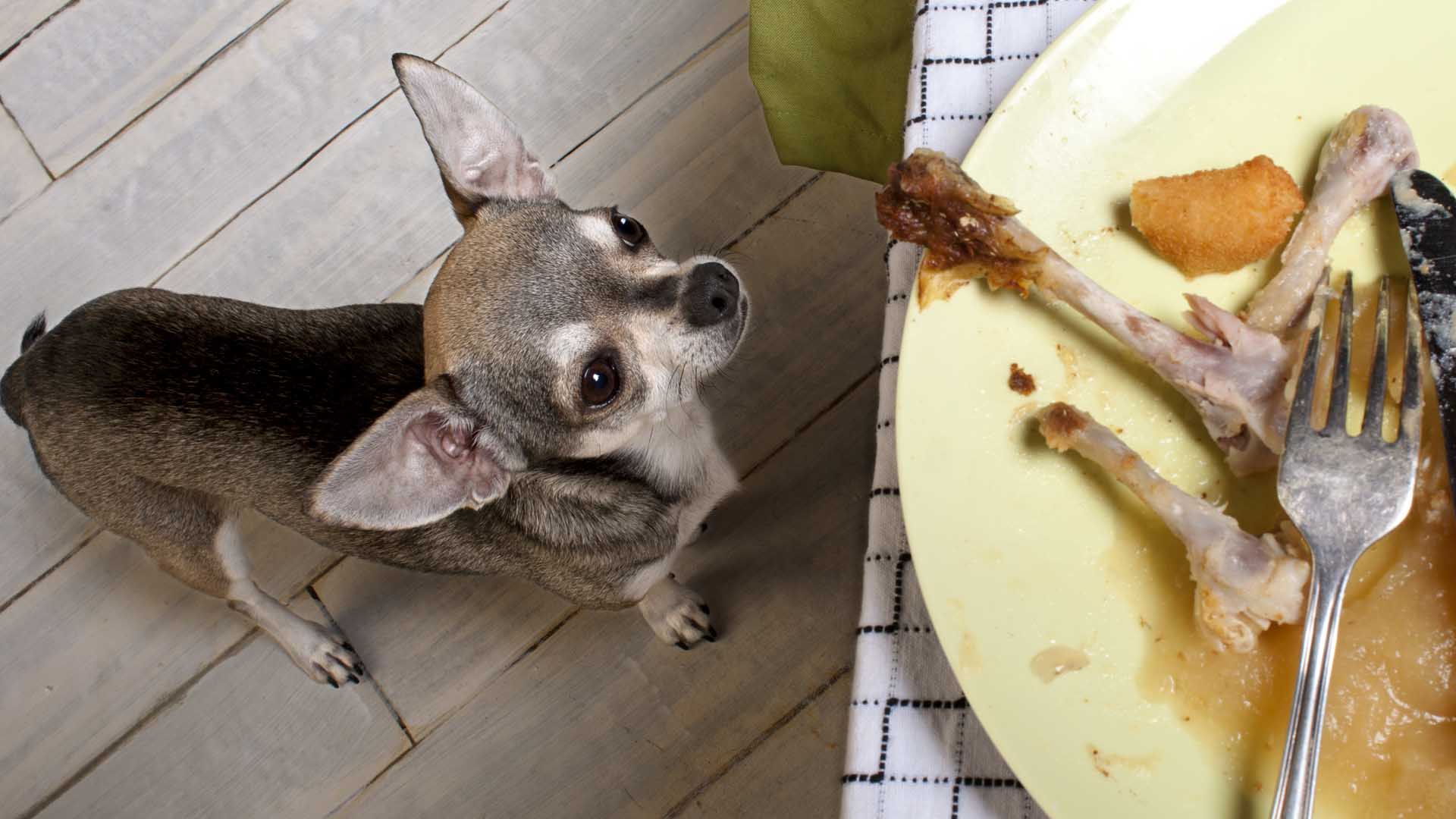 watch them for a while to ensure no vomiting or diarrhea occurs.
watch them for a while to ensure no vomiting or diarrhea occurs.
Table scraps – It goes without saying that table scraps aren’t good for your pet. If we don’t eat them, they shouldn’t either. Sometimes, even if you keep the table scraps from your pets, they’ll still find a way to have a midnight snack. It’s a good idea to keep the trash bin away from your dog (or even cat) or have a receptacle with a lid that locks. By doing this, you can avoid waking up to a mess in the kitchen after your dog snuck downstairs and made a second meal off duck scraps from the holiday dinner. And, as said above, turkey or even duck skin is high in fat and can cause pancreatitis if your dog consumes too much.
Holiday decorations and plants and flowers
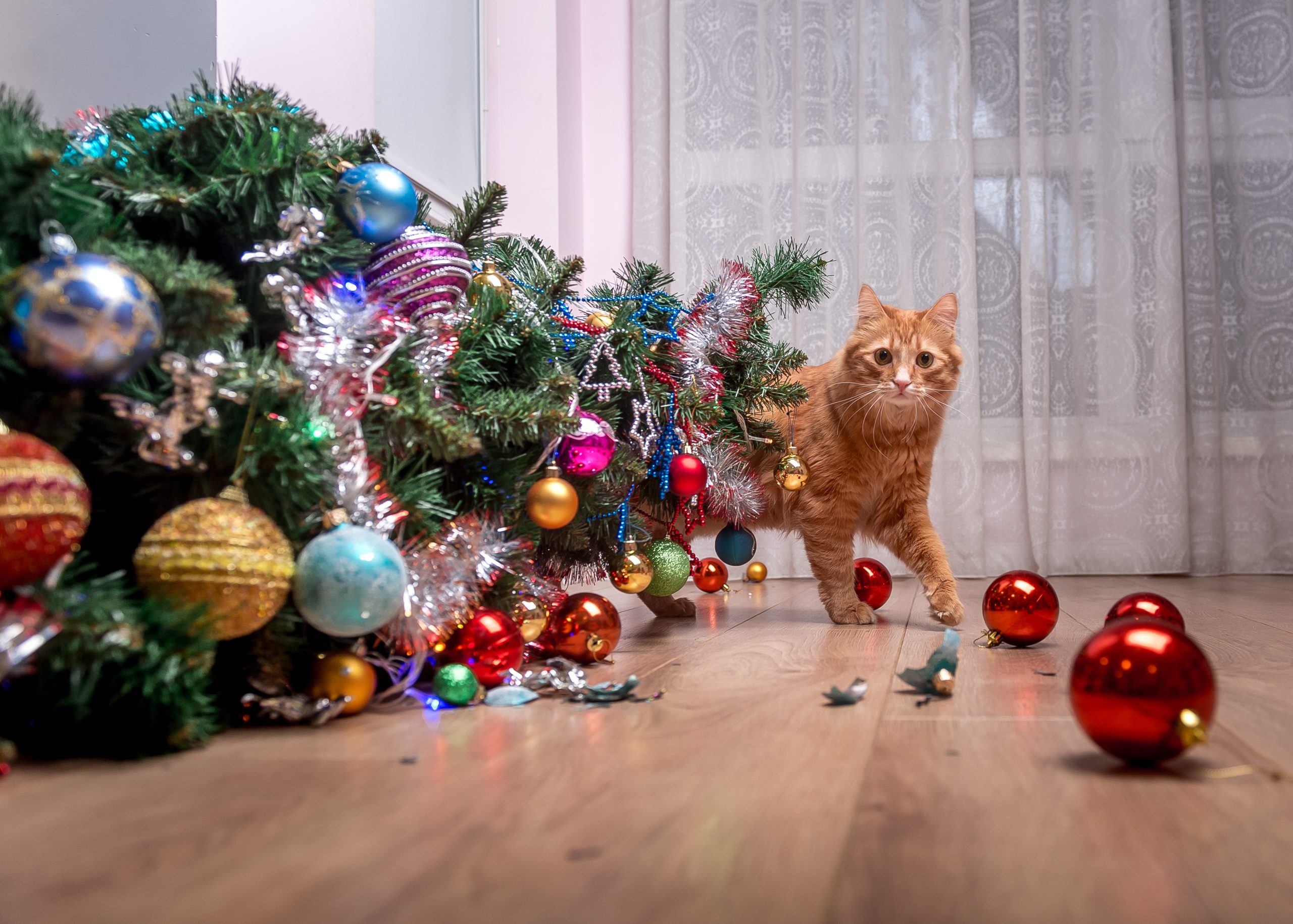
Whether you’re decking the halls with holly and berry or hiding Easter eggs in green plastic grass, holiday decoration is a tradition for many families. But if you have a dog or cat, it’s an excellent idea to pet-proof some of that holiday magic.
Electrical cords and strings of lights can cause your dog or cat to get little burns in their mouths and can also lead to significant trauma if they start gnawing through the cords. “It’s called noncardiogenic pulmonary edema — basically, they’re being electrocuted,” said Dr. Allukian. Make sure you tape down the cords or use cord covers to help deter your pet’s urge for an afternoon snack.
If you have a Christmas tree, the colorful baubles hanging on the branches can intrigue a curious pet (especially a cat). Use plastic decorations if you can; glass can shatter and end up embedded in their tiny toe beans—or worse, ingested. Tinsel is especially dangerous for cats, depending on how much they ingest. A strand or two would probably pass fine without worry, but if she eats a lot, the tinsel can wind itself into a ball, creating a massive obstruction in her intestines.
It’s important to remember that items used to fill baskets during Easter can be hazardous to curious pets. Both brightly colored decorative grass and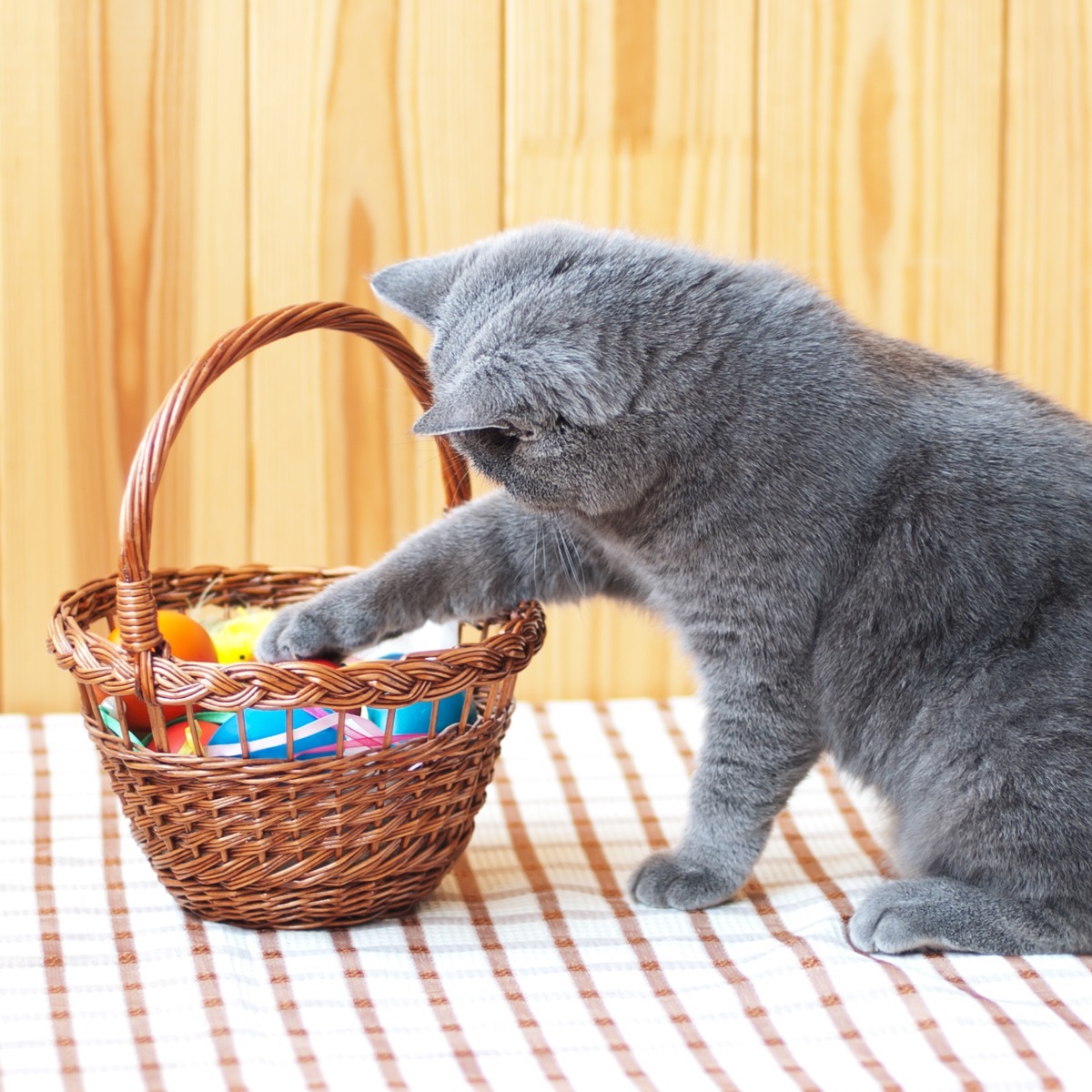 plastic eggs are not digestible and can cause serious gastrointestinal blockages if consumed. If a cat eats Easter basket grass, it can build up into a tangled knot, get stuck in the stomach and intestines, and result in what veterinarians call an obstruction. This can lead to a trip to emergency care on Easter, which is something no one wants!
plastic eggs are not digestible and can cause serious gastrointestinal blockages if consumed. If a cat eats Easter basket grass, it can build up into a tangled knot, get stuck in the stomach and intestines, and result in what veterinarians call an obstruction. This can lead to a trip to emergency care on Easter, which is something no one wants!
Plants and flowers are popular during the holidays. If you’re hoping for a Christmas kiss and have some mistletoe hanging up, it’s best to keep it there and away from your pets. Mistletoe contains lectins and phoratoxins, which can affect the heart and cause low blood pressure if consumed. Again, it all depends on the amount, but if your dog or cat eats a lot of the mistletoe, you can expect GI problems like diarrhea, vomiting, and difficulty breathing.
One of the most favorite winter houseplants is the poinsettia — and believe it or not, these bright holiday flowers are not toxic to pets! If your dog or cat happens to nibble on a leaf, they may experience drooling or vomiting, but that’s about it. Still, it’s wise to keep an eye out for the curious cat sniffing around the poinsettia. (Cat owners have cleaned up enough vomit already!)
From peppermint to pine, the smell of the holidays is intoxicating, and sometimes it can harm your pets. “People burn a lot of candles or scented oils during the holidays,” said Dr. Allukian. “The smoke can irritate your pet’s respiratory system and worsen any preexisting issues like asthma or tracheal issues.” Scented oils can be harmful, too, especially for cats. A cat can ingest the oil after licking it off its fur, which causes digestive and sometimes neurological issues – and this is in addition to the skin irritations that may occur.
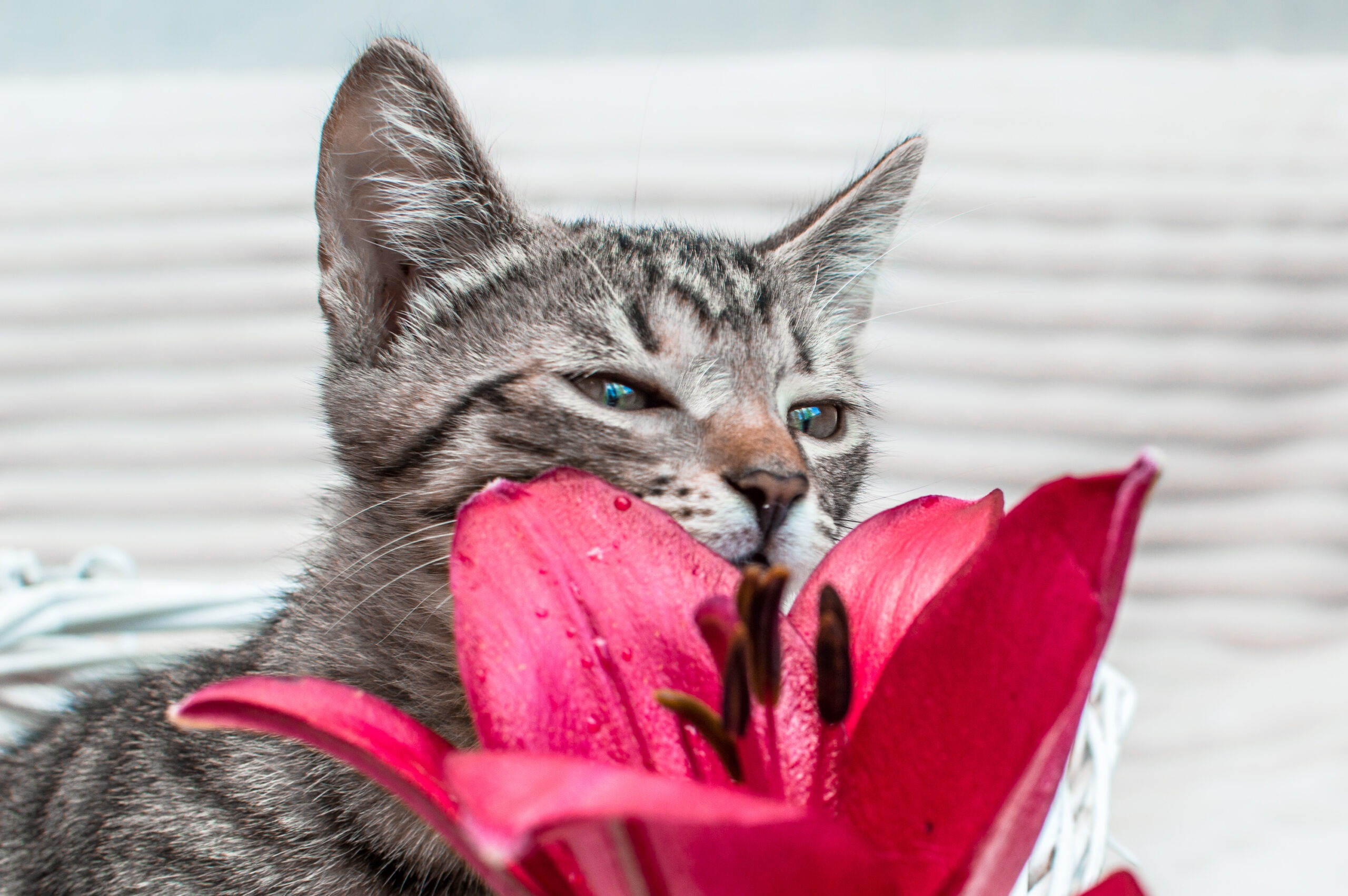 Lilies are a favorite during the Easter and spring seasons. However, all parts of the lily plant, including the stems, leaves, flowers, pollen, and water in a vase, are toxic to cats and dogs. Ingesting even a small amount of lily material can cause kidney failure and death within 12 to 72 hours.
Lilies are a favorite during the Easter and spring seasons. However, all parts of the lily plant, including the stems, leaves, flowers, pollen, and water in a vase, are toxic to cats and dogs. Ingesting even a small amount of lily material can cause kidney failure and death within 12 to 72 hours.
Lastly, ornate, beautiful snow globes also pose a hazard to your pet. While you may think the water in the globe is just that, some snow globes are filled with ethylene glycol, which is found in antifreeze and windshield wiper fluids. “Ethylene glycol is sweet, so it’s an attractive liquid for pets to drink,” said Dr. Allukian. “Even a small amount is toxic and could cause kidney failure.”
While it’s difficult to completely pet-proof your home for any impending danger, it is important to think of your pets and look out for their well-being, especially during such a hectic time. Try to take extra care — no one wants to spend any holiday moment in the emergency room.
We at the MSPCA-Angell wish you and your family a safe and happy holiday!



